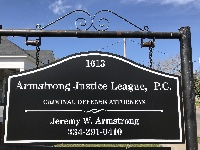Seale Misdemeanor Lawyer, Alabama
Not enough matches for Seale Misdemeanor lawyer.
Below are all Seale Criminal lawyers.
Jeremy W. Armstrong
✓ VERIFIEDCriminal, Felony, Misdemeanor, DUI-DWI, State Appellate Practice
"A Criminal & D.U.I. Defense Law Firm"
I have spent my entire legal career in the criminal justice system as a former prosecutor and a criminal defense attorney since October 2000. In Apri... (more)
Connie Jo Cooper
Wills & Probate, Divorce & Family Law, Criminal, Medical Malpractice
Status: In Good Standing Licensed: 32 Years
FREE CONSULTATION
CONTACTCharles Eddie Floyd
Social Security, Workers' Compensation, Criminal, Slip & Fall Accident, Accident & Injury
Status: In Good Standing Licensed: 53 Years
Jo Anna Chancellor Parker
Divorce & Family Law, Criminal, Wrongful Death, Personal Injury
Status: In Good Standing Licensed: 22 Years
James Edward Hall
Social Security -- Disability, Criminal, Wrongful Death, Personal Injury
Status: In Good Standing
Ralph Michael Raiford
Accident & Injury, Criminal, Estate, Traffic
Status: In Good Standing Licensed: 46 Years
Roger W. Pierce
Business, Bankruptcy & Debt, Criminal, Divorce & Family Law, Accident & Injury
Status: In Good Standing
Ben Elton Bruner
Criminal, Immigration, Agriculture, White Collar Crime
Status: In Good Standing Licensed: 40 Years


